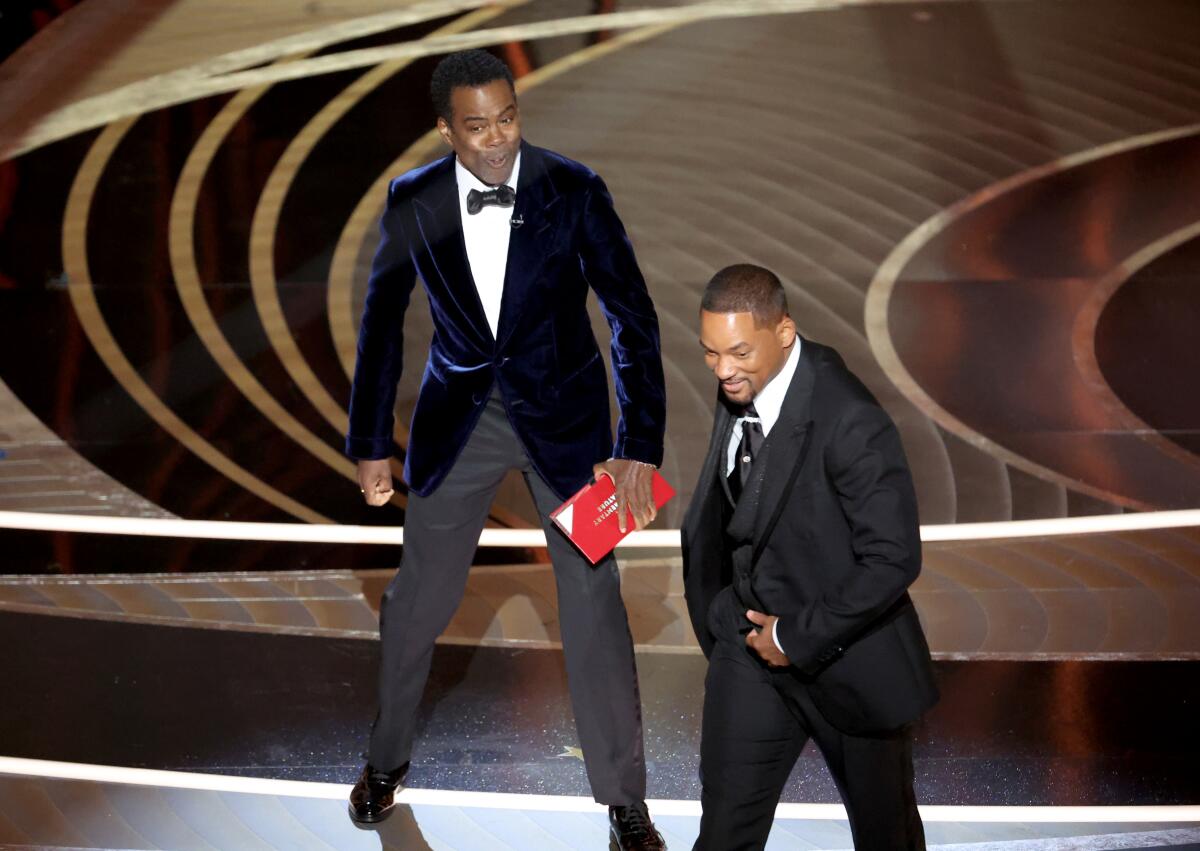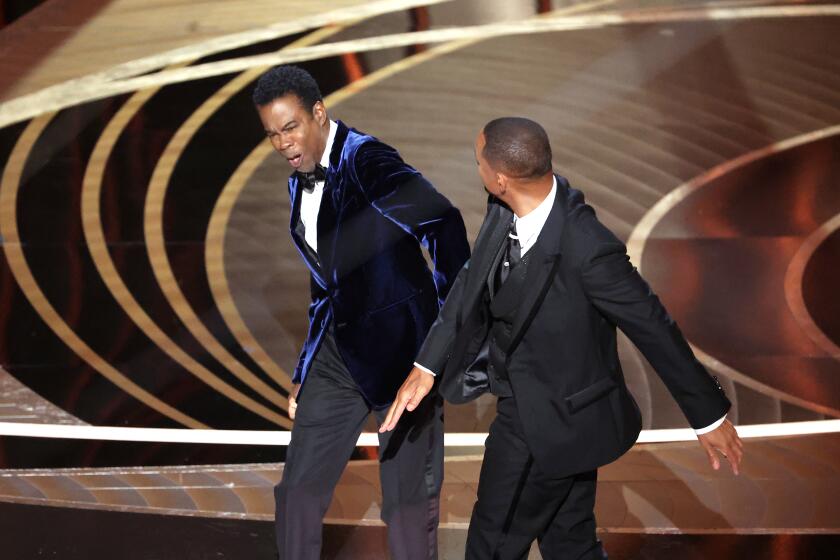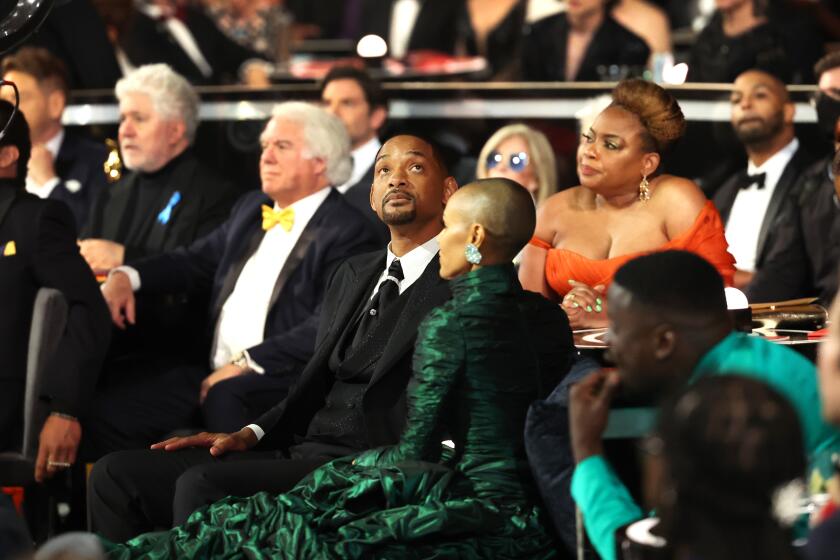Review: The Oscars promised high drama. They got more than they bargained for

It was the slap heard round the world, or at least among the dwindling population of TV viewers who still bother to watch the Oscars. Will Smith’s hand connected with Chris Rock’s face during a live broadcast of the 94th Academy Awards on Sunday evening, an awards show that promised big changes, but probably never bargained for anything that big.
Rock was presenting the award for documentary feature, but before announcing the nominees or the winner (“Summer of Soul”), the comedian joked about Smith’s wife, Jada Pinkett Smith, who was seated next to her husband at the Dolby Theatre in Hollywood. “Jada, I love ya. ‘G.I. Jane 2,’ can’t wait to see it,” Rock said, seeming to refer to the actor’s short hair. Pinkett Smith, who suffers from alopecia, was not amused. And neither was her spouse.
“King Richard” star Will Smith stormed the stage, slapped the comedian, then made his way back to his seat as ABC bleeped the audio feed. But it wasn’t hard to read Smith’s lips: “Leave my wife’s name out your f— mouth,” he yelled at Rock.
The next time Smith was on stage it was to accept lead actor award for his role as Richard Williams, the protective and demanding father of tennis stars Serena and Venus. He was visibly shaken, tears streaming down his face as he apologized to fellow nominees and the motion picture academy ... but not to Rock. “Art imitates life,” said Smith. “I look like the crazy father, just like they said about Richard Williams.”
Yes, Will Smith just slapped Chris Rock at the Academy Awards. No, it wasn’t planned. Here’s how Smith later addressed it.
The confrontation wasn’t just shocking, it was also ironic given the show’s theme: “Movie Lovers Unite.” The rallying cry is more like a plea from an industry that’s struggled during the pandemic, and a show that’s ratings have dropped year after year (in 2020, domestic viewership for Hollywood’s biggest night dwindled to a record-low 10.5 million). The aim of first-time Oscars producer Will Packer was to shake things up this year, and he did just that by tapping music, television and sports for the star power and notoriety missing among many of the film nominees.
The academy’s decidedly non-mainstream choices reflected the eclectic tastes of a changing voting body. None of the year’s top 10 domestic-grossing films made it into the lineup of films nominated for best picture, and one of the most-viewed of the 10 contenders — Netflix‘s “Don’t Look Up”— made less than $1 million at the box office.
Chatter on social media suggested that the most highly awaited moment going into the Oscars wasn’t about who or what might take home a golden statue. It was excitement around a performance of the infectious hit “We Don’t Talk About Bruno,” from Disney’s animated “Encanto” — and the song wasn’t even nominated. (The film, however, won for animated feature).
Serena and Venus Williams kicked off the telecast, introducing a stunning performance by Beyoncé of the nominated song from “King Richard,” “Be Alive.” The elaborate number with dancers and an orchestra dressed in tennis ball yellow was filmed at the courts in Compton where the women learned how to play. “Extreme sports legends” Shaun White, Kelly Slater and Tony Hawk ushered in a tribute to the James Bond blockbuster franchise. “No Time to Die,” of course, was not chosen to compete for the top prizes. Perhaps too many people had seen it?
Overall, the production was much tighter and brighter than in recent years, thanks in large part to powerful music numbers, a diverse mixture of guests, and the bitingly funny trio of hosts, Wanda Sykes, Amy Schumer and Regina Hall. They were the first to play masters of ceremony since 2018, and the first all-female trio to host the Oscars.
Together they lampooned the flagging power of film, and the obscurity of the titles that were nominated. “Here at Oscars, where movie lovers unite and watch TV,” joked Sykes in their opening. Then she referenced critics’ favorite, Jane Campion’s “The Power of the Dog” (she won for director): “You know I watched the movie three times and I’m halfway through it.” The women all urged each other to keep going. It might take days to get through, but soldier on, it’s worth it.
The Will Smith moment stole the Oscars, while ‘CODA,’ Ariana DeBose and Troy Kotsur all made history.
“I’m Amy Schumer, or as they know me in Hollywood, Melissa McCarthy said no,” said Sykes’ and Hall’s co-host, congratulating the crowd for making movies during a raging pandemic. “Give yourself a hand ... Yet they weren’t all great. A lot of them were pretty hard to understand. You know who you are. I didn’t see many, any of them. I didn’t see them.”
In a push to boost ratings, the academy pared down the awards given out during the live broadcast. Oscars for film editing, makeup and hairstyling, original score, production design, and sound, as well as the three short-film categories, were handed out in the hour before the broadcast. The winners’ acceptance speeches were later edited into the live show. The drastic cut caused controversy, but it admittedly made for a more streamline show.
Popular films were recognized, but not by the academy. The new “fan-favorite awards,” voted on by the People via Twitter, were thrown up on screen with clips from the films. For example, the top 5 favorite movie moments included the big battle with Thanos in “Avengers: Endgame” and Jennifer Hudson singing “And I Am Telling You I’m Not Going” from 2006’s “Dreamgirls.” But in 2022, she was snubbed for her amazing portrayal of Aretha Franklin in “Respect.”
The 2022 ceremony will be remembered for the altercation between two Hollywood luminaries, both of whom forged careers when big pictures actually won awards. It was the year film was supposed to unite, but instead it took a backseat to other mediums that still generate star power and ratings.
More to Read
The complete guide to home viewing
Get Screen Gab for everything about the TV shows and streaming movies everyone’s talking about.
You may occasionally receive promotional content from the Los Angeles Times.









